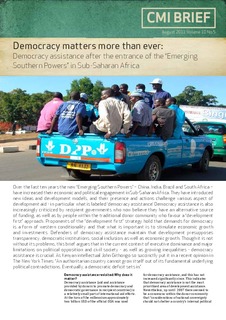| dc.description.abstract | Over the last ten years the new “Emerging Southern Powers” – China, India, Brazil and South Africa – have increased their economic and political engagement in Sub-Saharan Africa. They have introduced new ideas and development models, and their presence and actions challenge various aspect of development aid - in particular what is labeled ‘democracy assistance’. Democracy assistance is also increasingly criticized by recipient governments who now believe they have an alternative source of funding, as well as by people within the traditional donor community who favour a “development first” approach. Proponents of the “development first” strategy hold that demands for democracy is a form of western conditionality and that what is important is to stimulate economic growth and investments. Defenders of democracy assistance maintain that development presupposes transparency, democratic institutions, social inclusion, as well as economic growth. Though it is not without its problems, this brief argues that in the current context of executive dominance and major limitations on political opposition and civil society - as well as growing inequalities - democracy assistance is crucial. As Kenyan intellectual John Githongo so succinctly put it in a recent opinion in The New York Times: “An authoritarian country cannot grow itself out of its fundamental underlying political contradictions. Eventually, a democratic deficit sets in.” | |
